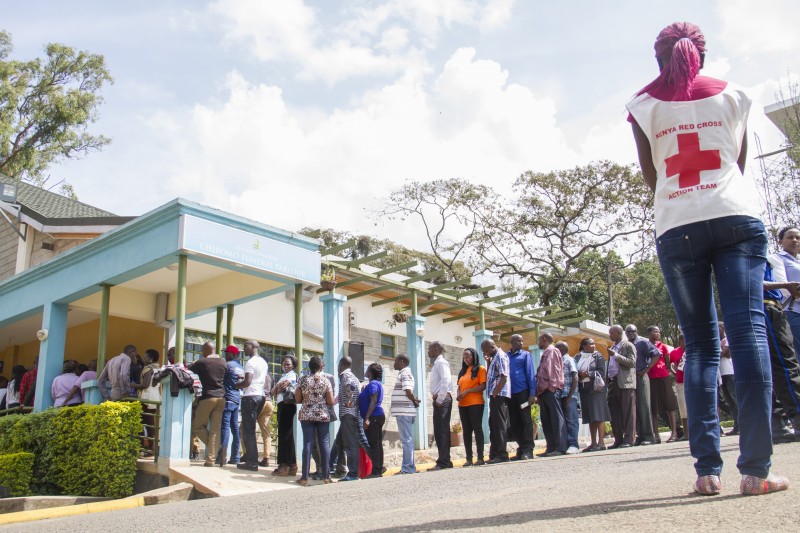
Relatives line up at the Chiromo funeral home in Nairobi to identify bodies of their kin killed after Al-Shabaab attacked Garissa University College in northeastern Kenya. Photo by Boniface Muthoni. Copyright Demotix
Al-Shabaab militants attacked Garissa University College in Kenya on 2 April 2015, killing at least 147 people, mostly students, and injuring 79. More than eight times as many people were cut down by the violence than were killed during the Charlie Hebdo shooting in France, which left 17 dead, yet the Garissa tragedy hasn't prompted anywhere near the same level of international solidarity as the Paris attack.
There was a similar criticism after the Baga massacre in Nigeria, which occurred around the same time as the Charlie Hebdo killings. While the latter saw an unprecedented show of sympathy with more than 40 heads of states participating in a rally of national unity, the former received scant coverage and attention.
In the wake of the horrific Garissa violence, Twitter users were quick to notice the lack of international reaction. Shekhar Kapur from Mumbai, India, concluded:
Lack of International reaction to the #GarrisaAttack compared to #JeSuisCharlie shows how little the world cares about #AfricanLivesMatter
— Shekhar Kapur (@shekharkapur) April 5, 2015
While Idriss Ali Nassah observed:
U jumped on #IamCharlie bandwagon.U even changed your profile pictures, but haven't said a word about #GarrisaAttack.Please ask yourself why
— Idriss Ali Nassah (@mynassah) April 5, 2015
Let's see how many of the African presidents who rushed to Paris for #CharlieHebdo march will head to #Kenya to protest #GarrisaAttack
— Idriss Ali Nassah (@mynassah) April 2, 2015
Life is sacred everywhere, @borderlessciti wrote, tweeting at media heavyweight Oprah Winfrey and Huffington Post editor-in-chief Arianna Huffington:
@Oprah @ariannahuff Every human life is Sacred, whether in #Paris or #Garrisa! #147notjustanumber #GarrisaAttack pic.twitter.com/It1OGNPaLw
— borderless citizen (@borderlessciti) April 5, 2015
‘Switch off television news’
Observers criticised what coverage Western media did give the attack, as well.
After CNN wrongly placed Tanzania in Uganda and Nairobi in Nigeria on a map of East Africa, the Africa is a Country blog suggested that people switch off television news to make sense of the attack:
To make sense of the attack by Al Shabaab on Garissa University near Kenya’s border with Somalia (official count of fatalities are 148; others say closer to 200), you may want to switch off television news. Especially since CNN is moving Nairobi to Nigeria and Tanzania to Uganda. Crucial will be how these attacks will be framed in the next few hours and especially how the Kenyan state will respond (already they’ve blamed the judiciary and in the past they’ve round up Somalis despite little evidence). Equally important is public opinion. So, like we did at the time of the attack by Al Shabaab on the Westgate Mall in Kenya’s capital Nairobi, we’ve compiled a bunch of links, including some twitter accounts, we suggest you read or follow.
Idriss Ali Nassah stressed the need for Africa to tell its own stories:
BBC is broadcasting a debate, CNN is fixated on the Iran nuclear deal. Africa needs own media houses to tell our stories #GarrisaAttack
— Idriss Ali Nassah (@mynassah) April 2, 2015
KiGossip.Com wondered why a CNN journalist would ask a survivor if he/she was scared:
So, a CNN Journalist asked a survivor from the Garrisa Attack: ‘WERE YOU SCARED'? Absolute MADNESS… Dis chap sd be FIRED.
— KiGossip.Com (@KitamirikeAndy) April 6, 2015
However, a few users noted that even local media houses are not doing a good job:
Let's just agree that local media did/has done a shoddy job in covering #GarrisaAttack. Bait headlines and shallow reporting.
— PluckyAdage (@PluckyAdage) April 5, 2015
As @StandardKenya runs pictures of families in pain but quotes from politicians. Shame on you. #147notjustanumber pic.twitter.com/ppji2gHMDL
— Ory Okolloh Mwangi (@kenyanpundit) April 5, 2015
Africans blaming the West from moving on so fast from the #GarrisaAttack yet our own media moved on first.
— AyoBrayo (@iOceanBrayo) April 6, 2015
JuwelsM argued that Africans should drive their own narrative:
@mynassah We r all terribly guilty of undervaluing ourselves.Perhaps it's time we stop waiting 4 the West 2 decide 4 us what's important.
— JuwelsM. (@JuwelsM) April 5, 2015







12 comments
It’s Africa, things like this happen everyday
Africa is a huge continent with many, many countries. It is not one big mess like the West likes to portray. They are people with families and love. Massacres like this do not occur everyday.